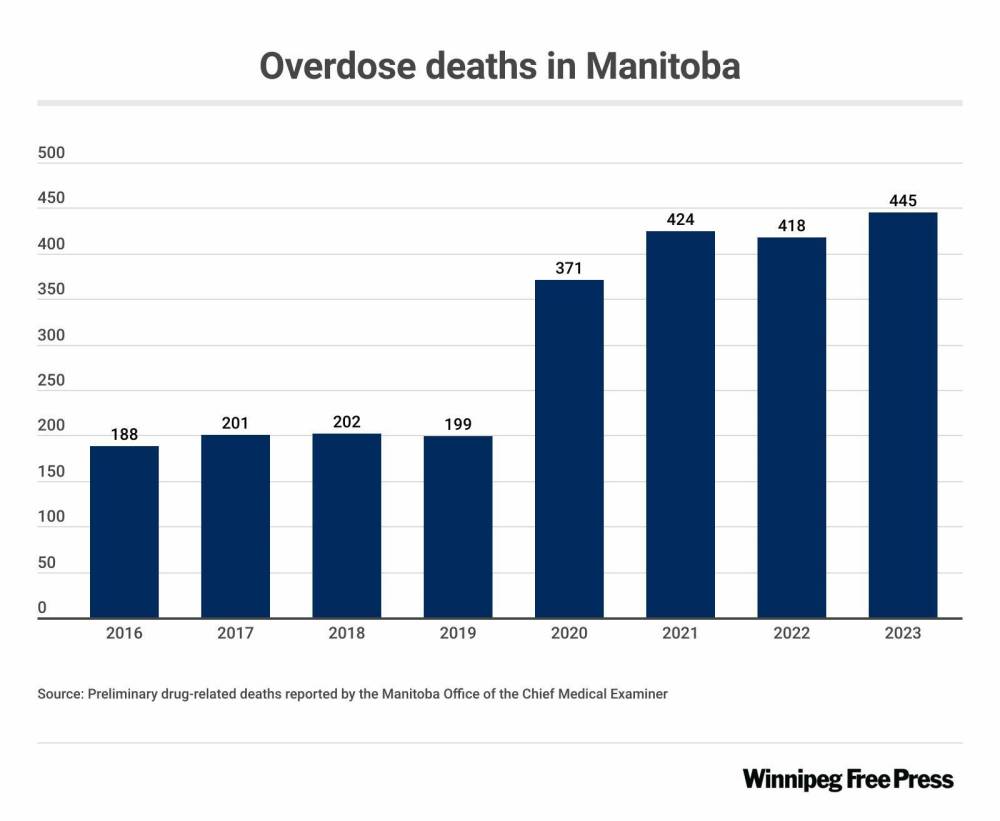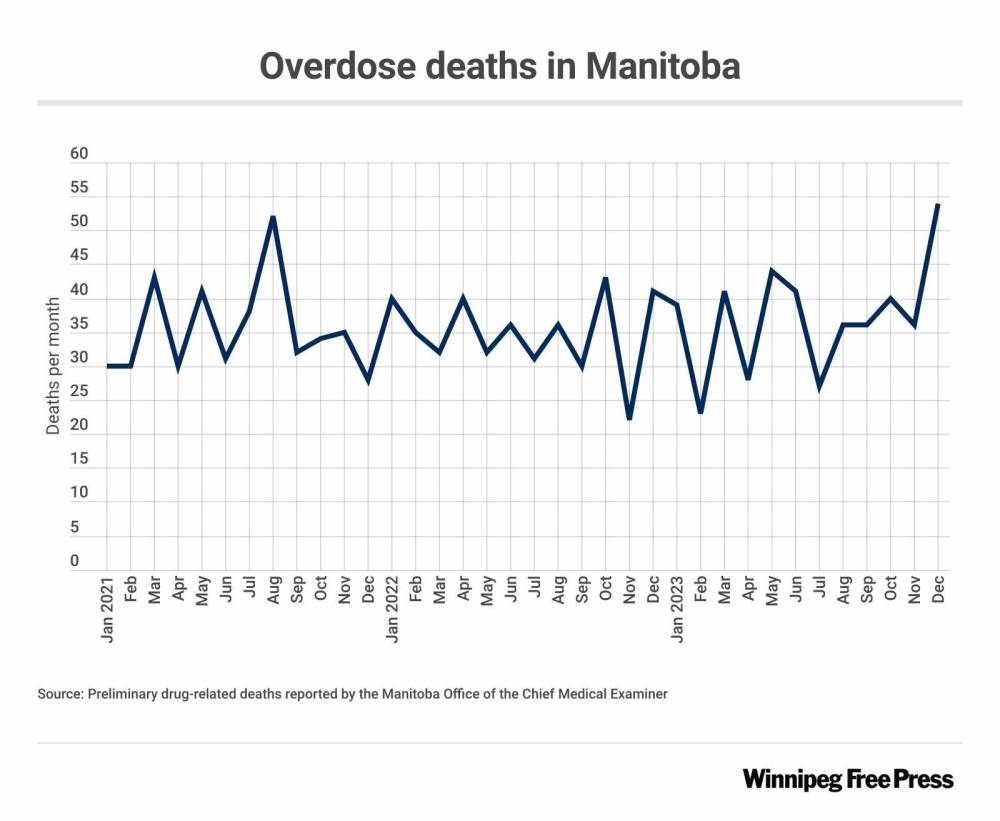Drug deaths reach record high in 2023 Time to declare state of emergency in Manitoba: advocate
Read this article for free:
or
Already have an account? Log in here »
To continue reading, please subscribe:
Monthly Digital Subscription
$19 $0 for the first 4 weeks*
- Enjoy unlimited reading on winnipegfreepress.com
- Read the E-Edition, our digital replica newspaper
- Access News Break, our award-winning app
- Play interactive puzzles
*No charge for 4 weeks then billed as $19 every four weeks (new subscribers and qualified returning subscribers only). Cancel anytime.
Read unlimited articles for free today:
or
Already have an account? Log in here »
The number of annual drug deaths in Manitoba climbed to a record high in 2023, prompting sorrow and more calls for action from advocates.
There were 445 drug-related deaths last year, up slightly from 418 in 2022 and 432 in 2021, based on initial data from the province’s chief medical examiner, which was released Monday.
The year-end total was calculated with the release of preliminary monthly statistics for December, when 54 drug-related overdose deaths were counted.
Of those, 41 involved at least one opioid, including fentanyl.
“To me, this would be a good time to declare a state of emergency and say, ‘We need to do something about this,’” said Arlene Last-Kolb, the Manitoba regional director of Moms Stop the Harm, a group of parents who’ve lost children to drug poisonings. “Fifty-four people. We have to remember that that’s somebody’s daughter or son, somebody’s father or mother.
“I don’t know how much evidence we need to say we have to do more.”
The second-highest monthly total of drug-related deaths in 2023 was 44 in May.
“I don’t know how much evidence we need to say we have to do more”–Arlene Last-Kolb
“I feel deeply saddened every time we see these reports from the Office of the Chief Medical Examiner,” said Marion Willis, executive director of St. Boniface Street Links.
She has called for more co-ordination between provincial and municipal government departments, emergency services and outreach organizations to help tackle Winnipeg’s drug crisis and related issues, such as chronic homelessness, mental health and crime.
A member of the St. Boniface Street Links team died last weekend after overdosing on fentanyl, said Willis.
“The ripples from this are huge,” she said.
Last-Kolb’s 24-year-old son, Jessie, died from a fentanyl overdose in 2014. She and fellow members of Moms Stop the Harm advocate for more harm-reduction and treatment services.
Last-Kolb recently wrote an op-ed piece for the Free Press to lobby for a safe-supply model which would allow people access to drugs that have been tested, as an alternative to the toxic illegal drug supply.
Kathryn Braun, director of the chief medical examiner’s office, said “down,” of which there are many variants, is the street drug that accounts for most drug-related deaths.
It is a cocktail of illicit substances, with fentanyl and methamphetamine common in almost every variant.
“Each variant of ‘down’ will also have other substances added in… to increase potency and the subjective ‘high,’” Braun wrote in an email to the Free Press.
She said the drugs that are responsible for most of the fatalities are fentanyl, para-fluorofentanyl, cocaine and methamphetamine.
There has been an increasing prevalence of potent benzodiazepines in “down” cocktails, Braun said.
Housing, Addictions and Homelessness Minister Bernadette Smith said Monday the government is concerned about the toxic drug supply “and continues to work on solutions to the addictions crisis. We are committed to addressing the impacts of substance use in our communities, especially after years of neglect. ”
A November mandate letter from Premier Wab Kinew directed her to establish a site in downtown Winnipeg to “save lives and connect Manitobans with health care and social supports.”
Smith was also directed to create systems for testing toxic drugs, expand detox beds and addiction treatment options, and take a harm-reduction approach to the addictions crisis.
No timeline has been given for a supervised consumption site. The NDP will unveil its first budget April 2.
The former Progressive Conservative government rejected supervised consumption sites and instead focuses on addictions treatment.
Willis said a multi-faceted approach is necessary. Many users assisted by St. Boniface Street Links take drugs in their homes or the homes of people they know, she said.
“We need to come together and realize the ‘using population’ is not all the same,” she said.
Last-Kolb said images of people “shooting up” on the street are polarizing and stigmatizing.
“They didn’t all die on the street,” she said of those who died in 2023.
Suspected drug-related deaths are identified by the chief medical examiner based on analysis of toxicology reports, reviews of circumstances and autopsy findings.
Final or confirmed statistics are reported once medical examinations are fully completed.
— with files from Malak Abas
chris.kitching@freepress.mb.ca

Chris Kitching
Reporter
As a general assignment reporter, Chris covers a little bit of everything for the Free Press.
History
Updated on Monday, March 25, 2024 7:14 PM CDT: Updates Bernadette Smith statement








